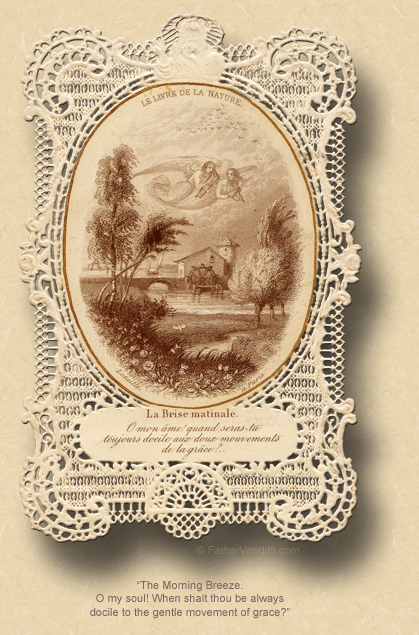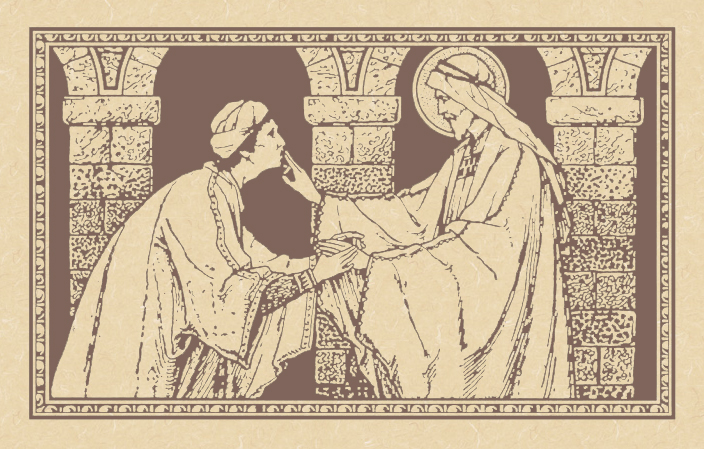Father Michael's First Rule for the Interior Life: Mind Your Own Business.
The Twenty-First Tuesday of Ordinary Time; or, the Memorial of Saint Rose of Lima, Virgin.*
Lessons from the secondary feria, according to the ordinary form of the Roman Rite:
• II Thessalonians 2: 1-3, 14-17.
• Psalm 96: 10-13.
• Matthew 23: 23-26.
|
…or, from the proper:
• II Corninthians 10: 17—11: 2.
• Psalm 148: 1-2, 11-14.
• Matthew 13: 44-46..
…or, any lessons from the common of Virgins for One Virgin.
|
The Third Class Feast of Saint Philip Benizi, Confessor.**
Lessons from the common "Justus ut palma…" of a Confessor not a Bishop, according to the extraordinary form of the Roman Rite:
• I Corninthians 4: 9-14.
• Psalm 36: 30-31.
• Luke 12: 32-34.
The Otdanije (Leave-Taking) of the Dormition.***
Lessons from the pentecostarion, according to the Ruthenian recension of the Byzantine Rite:
• Galatians 2: 21—3: 7.
• Mark 6: 1-7.
FatherVenditti.com
|
 8:22 AM 8/23/2016 — Today's Gospel lesson is not only familiar, but very easy to understand. Our Lord labels the scribes and Pharisees hypocrites for doing what the Church would like to avoid doing: practicing their faith for show rather than in reality. The imagery He uses is quite striking: paying tithes in mint or dill or cumin (cf. Matt. 23: 23), all very expensive spices in the day—depending on where you shop, they can still be—but failing to live a moral life. It's a sad circumstance you see once in a while when you're the pastor a parish: the wealthy individual who's on his third marriage, but who will show up at Christmas and Easter and drop a thousand bucks into the collection basket, as if donating money to the Church will wash away his sins. A truly conscientious parish priest will tell him that if he really wants to do something for our Lord, he'll keep his money and straighten out his life, which may or may not ingratiate him to his parish council or his bishop, depending on who those people are. 8:22 AM 8/23/2016 — Today's Gospel lesson is not only familiar, but very easy to understand. Our Lord labels the scribes and Pharisees hypocrites for doing what the Church would like to avoid doing: practicing their faith for show rather than in reality. The imagery He uses is quite striking: paying tithes in mint or dill or cumin (cf. Matt. 23: 23), all very expensive spices in the day—depending on where you shop, they can still be—but failing to live a moral life. It's a sad circumstance you see once in a while when you're the pastor a parish: the wealthy individual who's on his third marriage, but who will show up at Christmas and Easter and drop a thousand bucks into the collection basket, as if donating money to the Church will wash away his sins. A truly conscientious parish priest will tell him that if he really wants to do something for our Lord, he'll keep his money and straighten out his life, which may or may not ingratiate him to his parish council or his bishop, depending on who those people are.
Straining the gnat and swallowing the camel (cf. v. 24): there's all kinds of people we could identify with that one, people who hyperventilate over the most microscopic intricacies of the practice of the faith, such as wanting to debate you every week about whether women should have their heads covered in church, but who can't seem to ever be on time for Holy Mass.
Cleaning the outside of the cup and the dish (cf. v. 25) is a particularly interesting one, and one that I've often liked to apply to priests, particularly those who are obsessed with making sure their churches are pristine and the sacristy stocked with all the latest vestment designs and seeing that the lawn of the rectory looks like a golf course, but would never think of preaching the truth since that would offend people and drive people away and turn off the money spigot.
Those, of course, are all people that I've known over the years, and who come to mind whenever I read this lesson; you might see in our Lord's examples entirely different people based on your own experience. And doing that, of course, is always a temptation toward the sin of pride, since we should be looking at ourselves, not at others, when we read these lessons from our Lord.
Which is why I'm going to avoid any more of it, and speak just a little bit about our Apostolic lesson from Paul's Second Epistle to the Thessalonians, giving me the opportunity to keep a promise I made back at Easter time to focus a little more on the first lessons at Holy Mass, as well as revisit a series I preached to you the first year I was here: Father Michael’s Rules for the Interior Life.
Both of Paul’s letters to the Thessalonians are quite brief because his stay there was brief. He founded the Church in Thessalonica during his second missionary journey, about AD 50. He had just dropped off his young friend, Timothy, in Ephesus as their new bishop, and was on his way into Macedonia to take the Gospel there, when he got some disturbing news about troubles that his friend was having back in Ephesus, so he writes letters both to the Ephesians and to Timothy personally.  While he's in Macedonia, he receives a vision begging him to cross over into Greece, and this he does. His first stop is Philippi, where he is imprisoned and miraculously set free; next he stops in Thessalonica, but is forced out by the Jews there; then he goes to Athens where he tries to preach the Gospel to the Greek Philosophers, but they just laugh him out of town. He does manage to make a few converts in these places, and he writes letters later to most of these people, and we can read them in the New Testament. While he's in Macedonia, he receives a vision begging him to cross over into Greece, and this he does. His first stop is Philippi, where he is imprisoned and miraculously set free; next he stops in Thessalonica, but is forced out by the Jews there; then he goes to Athens where he tries to preach the Gospel to the Greek Philosophers, but they just laugh him out of town. He does manage to make a few converts in these places, and he writes letters later to most of these people, and we can read them in the New Testament.
The only letter we don't have is one to the Athenians; it's possible he didn't even bother given the reception he got there; but, his encounter with them is recorded in the Acts of the Apostles (cf. Acts 16: 16—18: 1), where Saint Luke reproduces the sermon that Paul gave in the "Temple to the Unknown God," which he tries to tell them is really the God of Abraham, who became a man in the person of Jesus Christ. They don't buy it, and run him out of town. He clearly had hoped that Athens would be his crowning achievement, and it wasn't. And it's in this depressed and discouraged state that he first lays eyes on the great city of Corinth. What happened there is, of course, quite remarkable; but, that will be a story for another day. Suffice it to say, he's in Corinth for a long time, and it's from there that he writes both of these letters to the Thessalonians.
No one argues that there's any great theological or doctrinal truth in either of these letters;—such as the kind we get in his letters to the Corinthians, the Galatians, the Romans—the value of these letters is in the insight they give us into his own personality. The subject of Second Thessalonians in particular is a dispute that had arisen within the Church there about the Second Coming of Christ. Some were arguing that He was coming within their own lifetime, and that there wasn't much point to trying to organize things and make long range plans for anything, which was frustrating the efforts of those who were trying to put some order into the Church there. Some of the confusion seems to have stemmed from a misinterpretation of Paul's own words while he was there, so he has to make it right somehow.
What we learn about Paul in his handling of this situation is that he is very much a “big picture” guy. I like the way Msgr. Knox translates the passage:
Do not be terrified out of your senses all at once, and thrown into confusion, by any spiritual utterance, any message or letter purporting to come from us, which suggests that the day of the Lord is close at hand. Do not let anyone find the means of leading you astray (II Thes. 2: 2-3 Knox).
And at the end of the chapter, which is included in our lesson today, he tells them right out: “Stand firm, then, brethren, and hold by the traditions you have learned…” (v. 14). In other words, don't waste your time getting involved in these meaningless apocalyptic questions; just live the faith you received and let Christ worry about when He's coming again.
I got cornered one day after Mass in my former parish by a guy who was all upset and agitated about the Church's teaching on contraception, and I said, “Wait a minute. If memory serves, you're not married, and don't have any plans to be in the near future; so, why are you disturbing your interior life by wasting a single second on this issue?” I happen to believe that this is one of the Devil's most effective weapons: taking religious people and derailing them from inner peace and union with Christ by getting them all hot and bothered about things that simply don't concern them. Or, as our Lord put it in the Gospel lesson, straining the gnat and swallowing the camel.
Now, this is an awfully long homily for a ferial day in Ordinary Time, so I'll sum it up by giving you, once again, Father Michael's number one rule of the interior life: learn to mind your own business.

* The first saint of the American continent, Isabel Flores de Oliva (1586-1617) was born in Lima. Known as a mystic and nick-named "Rose" because of her beauty, she admired St. Catherine of Siena and became a Dominican tertiary at the age of twenty, living a life of monastic solitude. She is the patroness of both the Philippines and of all South America, particularly her native Peru.
** Born of a noble family, Philip Benizi entered the Order of Servites as a lay brother, but was later ordained to the Holy Priesthood and was eventually elected Superior General of his order, giving a splendid example of humility.
*** In the Byzantine Tradition, major feast days are marked by prefestive and postfestive periods. While there is no corresponding tradition in the West regarding prefestive days, the postfestive period is concomitant with the concept of an octave in the Latin Church, though it's duration is not necessarily eight days depending on the importance of the feast. The last day of the postfestive period is called the "Leave-Taking," Otdanije in Slavonic, actually a verb meaning "to return." The liturgy on the day of Otdanije mirrors that of the feast with minor variations.
The feasts of the Holy Martyr Lupus and of the Holy Martyr Irenaeus, Bishop of Lyon, ordinarily observed on this day, were transferred to yesterday because of the Leave-Taking.
|

